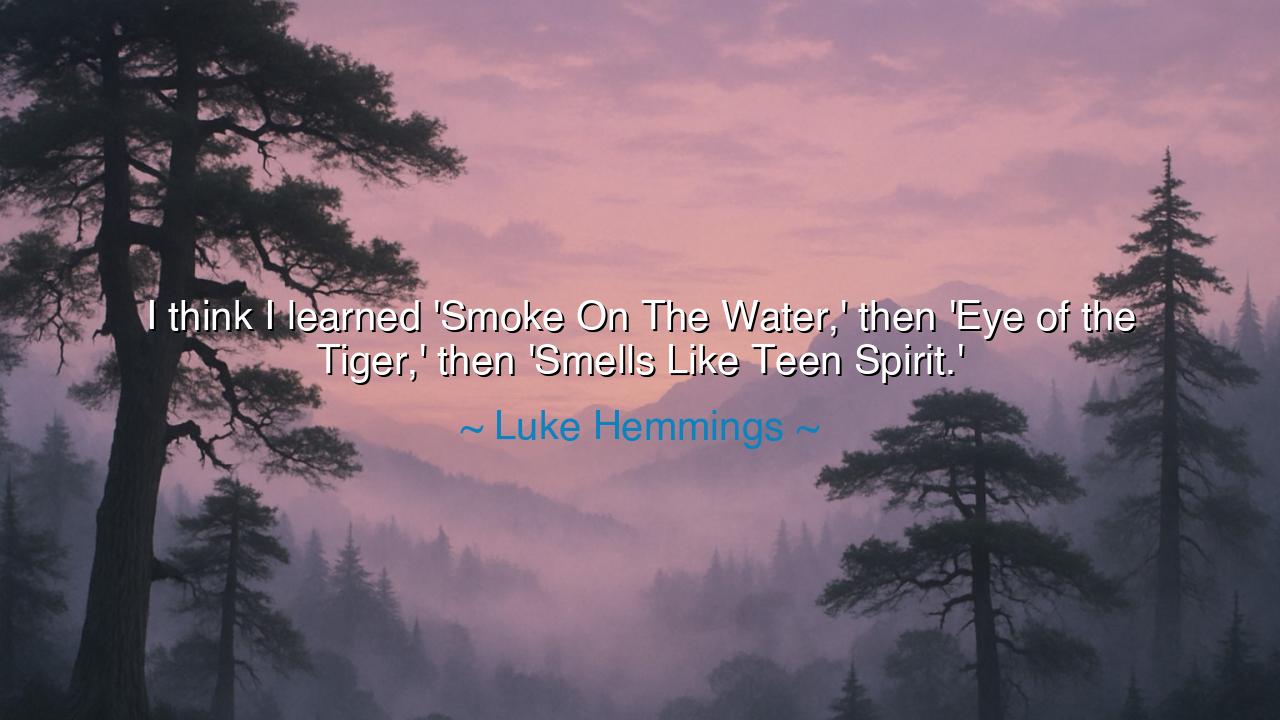
I think I learned 'Smoke On The Water,' then 'Eye of the Tiger,'
I think I learned 'Smoke On The Water,' then 'Eye of the Tiger,' then 'Smells Like Teen Spirit.'






When Luke Hemmings, voice and guitarist of 5 Seconds of Summer, recalled, “I think I learned Smoke On The Water, then Eye of the Tiger, then Smells Like Teen Spirit,” he was not merely listing songs, but charting the sacred path of initiation for countless musicians. In his words lives the memory of first encounters with greatness, the humble beginnings of craft, and the universal story of how passion takes root through imitation before it blossoms into creation. His quote is a testament to the power of music as a teacher, and to the way simple riffs can open the gates of lifelong artistry.
The meaning of his words lies in the stages of apprenticeship. Every master once began as a student, every artist once copied the strokes of another’s hand. Hemmings’s mention of these three songs is more than nostalgia; it is the acknowledgment that music is a lineage. Smoke On The Water gave him his first riff, Eye of the Tiger gave him rhythm and fire, Smells Like Teen Spirit gave him rebellion and raw emotion. Each song was a stepping stone, shaping his hands, his ears, his heart. In them we see how greatness is inherited before it is reinvented.
History offers many mirrors of this truth. The Renaissance painter Michelangelo studied the works of Giotto and Donatello before carving his own David. The great Japanese haiku masters began by imitating Bashō before they found their own voices. In every craft, the first works of genius come not from originality, but from practicing the patterns left by others. Hemmings’s journey from riff to riff reflects this eternal principle: to create, one must first learn from what already endures.
The songs he names are themselves symbolic. Smoke On The Water is the eternal beginner’s riff—four notes that carry the weight of rock history. Eye of the Tiger is an anthem of perseverance, forever tied to the spirit of the underdog rising in strength. Smells Like Teen Spirit is the cry of rebellion, the anthem of a generation refusing silence. To learn them in succession is not just to practice music—it is to inherit the spirit of rock itself: power, resilience, and defiance. Thus, Hemmings’s memory is also myth, a modern rite of passage.
And yet, his tone carries humility. He does not claim to have started with brilliance, but with songs that countless others before him had played in bedrooms and garages. In this humility lies the heart of wisdom: even the most celebrated artists were once beginners, struggling to master the same simple riffs that echo through the strings of millions. To admit this is to remind us that greatness is not born whole—it is carved by repetition, persistence, and the willingness to learn from the familiar before venturing into the unknown.
O seekers of wisdom, take this lesson into your lives: do not despise the simplicity of beginnings. Do not scorn the practice of imitation, for it is the forge where your skills are tempered. Like Hemmings, embrace the learning of riffs, the mastering of small steps, the repetition of what others have already done. For in these humble labors, you are not wasting time—you are building the foundation upon which your own voice will rise.
Therefore, let Hemmings’s words be a teaching: “I learned Smoke On The Water, then Eye of the Tiger, then Smells Like Teen Spirit.” See in them the map of all creative journeys: the beginning in simplicity, the growth in discipline, the flowering in rebellion and originality. Let them remind you that every great work begins in small, imperfect steps. Be patient, be faithful, and soon what began as imitation will grow into creation—and your own voice, like his, will join the chorus of those who dared to begin.






AAdministratorAdministrator
Welcome, honored guests. Please leave a comment, we will respond soon